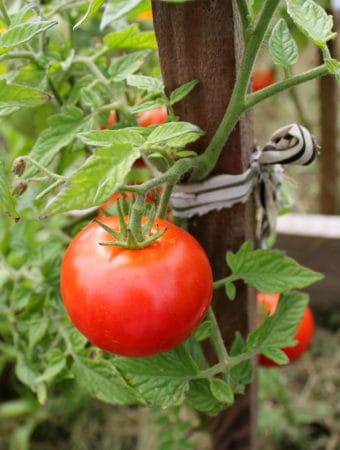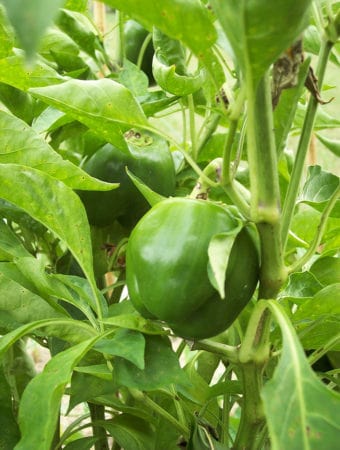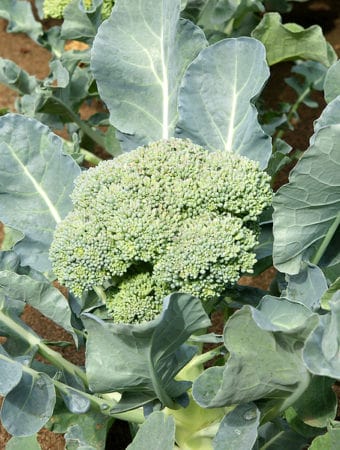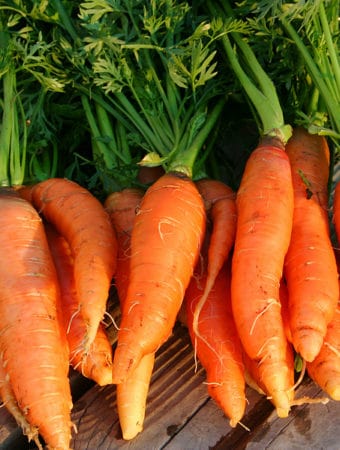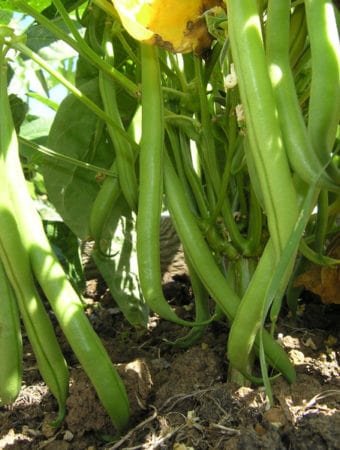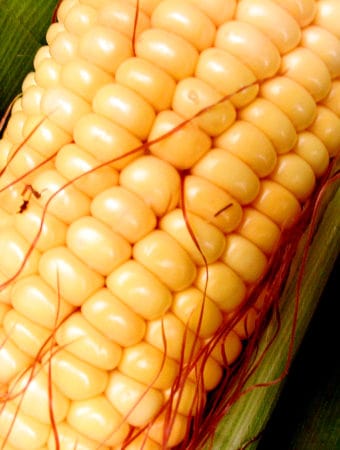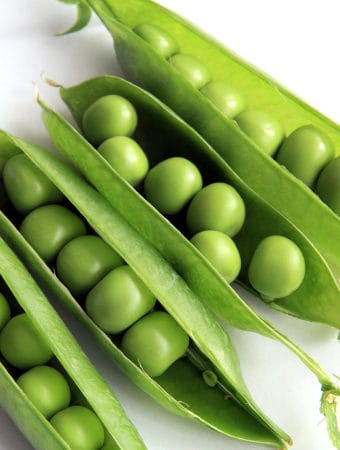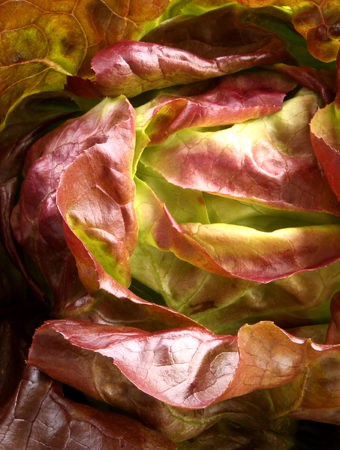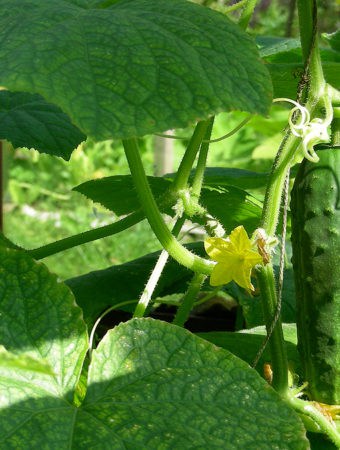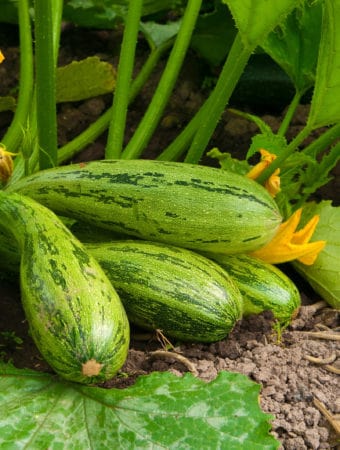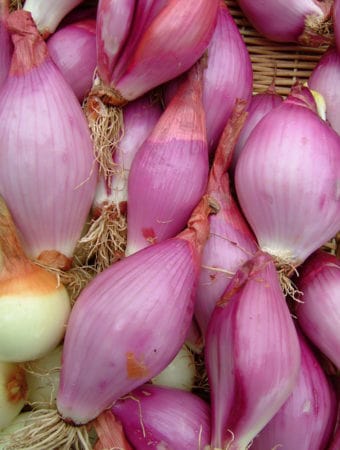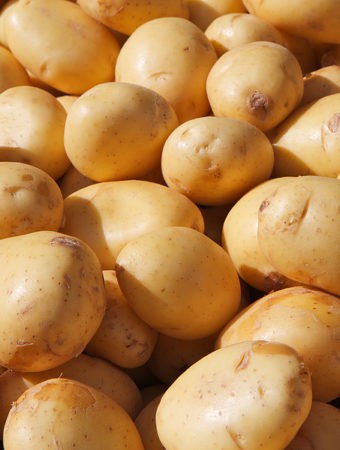Lemons are used to flavor both sweet and savory dishes. They are too tart to be eaten alone.
Lemons are rarely eaten raw because they are too tart for out-of-hand eating. Use lemons to flavor everything from salads to fruit desserts.
Ways to serve lemons
- Lemon is used to enhance the flavor of fish, shellfish, and meat dishes. Use lemon juice to marinate and tenderize meat, poultry, and game. Use lemon in salad dressings, marinades, sauces, and mayonnaise. Add lemon to melted butter to use as a dressing for cooked fresh artichokes, asparagus, broccoli, carrots, green beans, and spinach.
- Serve avocados, melons, or tropical fruits with lemon wedges to heighten the flavor. Use lemons to flavor ice cream, sherbet, mousse, tarts, pies, and cakes.
- Lemon can be used as a low-calorie seasoner and can take the place of salt in low-sodium diets. Add lemon juice or slices to lemonade, punches, ice teas, and cocktails. Lemon zest and dried candied peel can be used in confections and baked goods.
- The acidity in lemon juice will turn seafood and thinly sliced meat opaque and firm, similar to cooking. Lemon juice will prevent certain fruits and vegetables from browning after they have been cut.
- Use juice in place of vinegar in salad dressings and sauces.
- Use the juice to marinate and tenderize meat, poultry, fish, and game.
- Add lemon juice or oil at the end of cooking for the freshest flavor.
- Add zest to sautéed or roasted chicken and to flavor meats, sauces, and desserts.
- Lemon zest can be candied or dried and used to flavor meats, sauces, and desserts.
- Use juice to enliven lemonade, iced tea, tomato juice, fruit punches, and cocktails. Lemon juice is a thirst-quenching ingredient.
Perhaps the three most popular lemons are the Eureka, Lisbon, and Meyer.
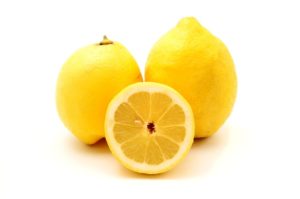
Eureka and Lisbon lemons
The Eureka lemon and the Lisbon lemon are two bitter-flavored lemons.
The Eureka and the Lisbon can be used to flavor both sweet and savory dishes. They can be used in sauces or as an accompaniment to fish and poultry. They can be used in baking and desserts, and their slices or wedges can be used as a garnish.
The juice of the Eureka and Lisbon lemons can be used to tenderize meat, as a substitute for vinegar in dressings, and as a flavoring in drinks.
The zest of the Eureka and Lisbon lemons—the yellow part of their peel—can be used to add flavor when cooking and baking.
The Eureka and Lisbon lemons are so similar in flavor, aroma, and acidity that they sometimes are lumped together in marketing.
But they do have their differences, and there are ways to tell them apart.
Eureka and Lisbon are two very sour and acidic lemons. They are so similar in flavor, aroma, and acidity that they sometimes are lumped together in marketing.
The Eureka lemon is a knobby, thick-skinned lemon with a short neck. The Lisbon lemon is smoother, thin-skinned with no neck. The blossom end of the Lisbon tapers to a slight point, the Eureka does not. The Eureka contains some seeds and a moderate amount of juice while the Lisbon is usually seedless and quite juicy.
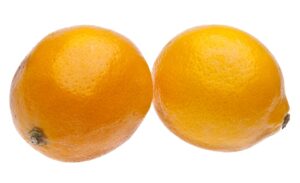
Meyer lemon
Both the Eureka and Lisbon are often contrasted to the Meyer lemon which has a sweeter-mild flavor and little acidity. The Meyer lemon has a thin, soft, smooth rind that is yellow-orange. The Meyer–which is not a true lemon but a cross between a lemon and a mandarin orange—is round and so easily distinguished from the more oblong Eureka and Lisbon.
The Meyer lemon is a cross between a lemon and a tangerine. Its sweet taste—lemon with a hint of its parent tangerine–has made it a favorite of cooks and gourmets. In fact, some chefs call the Meyer “the gourmet lemon.”
Meyers are more round and have a softer, more smooth rind than the bigger, commercial lemons—such as the Eureka and Lisbon. The pulp of the Meyer is deep yellow and it is less acidity than its sisters.
The Meyer takes its name from the American plant explorer Frank Meyer who discovered this lemon near Peking in 1908. By the way, the blossoms of a Meyer will fill a room with a wonderful sweet fragrance for days.
A ripe Meyer lemon will have a rich orange-yellow skin when ripe. Choose a bright, shiny fruit that is fat for its size.
Lemon harvest season
The peak harvest season for lemons is the winter months.
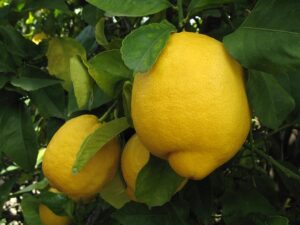
How to choose lemons
Select lemons that are smooth and close-grained, bright yellow in color, and have a shine to their skin. Lemons should be plump and firm and heavy for their size. Heavy, thin-skinned lemons will contain the most juice. Lemons with coarse or bumpy skins are likely to contain little flesh and are best for making lemon zest.
Lemons that are tinged green tend to be more acidic and will not contain as much juice. Avoid lemons with wrinkled skin or those with soft or hard patches. They will be over-mature. Dull-skinned lemons are no longer fresh.
How to store lemons
Eureka and Lisbon lemons can be kept in a plastic bag in the refrigerator for up to 2 weeks. (The Meyer lemon will keep for 1 week.) Lemons stored at room temperature will keep for about 1 week. The juice and zest of lemons can be frozen.
Refrigerated lemons should keep for up to a month.
How to preserve lemons
Lemon is the most common accompaniment for fish and other seafood dishes. It’s interchangeable with vinegar for many sauces and salad dressings.
Here is a way to preserve lemons for use as flavoring in marinades, salad dressings, and many fish and stew recipes. You will find the flavor a bit salty, pleasantly fermented, and just slightly bitter.
Use this method to preserve ‘Meyer’ lemons, limes, and oranges. The peak season for Meyers and oranges is the colder months. Other lemons and limes come to harvest in the warm months of the year.
(If you simply want to keep lemon and lime juice for out-of-season use, squeeze the fruit and freeze the juice in ice cube trays then store the cubes in plastic freezer bags.)
Preserved lemons
Ingredients
- 8 lemons (maybe more depending upon the size of the fruit)
- 1½ cups kosher salt
- Rosemary sprig and olive oil (optional)
Instructions
- Thoroughly rinse the lemons. Quarter each lemon by cutting through the skin lengthwise from top to bottom.
- Sprinkle some salt on the bottom of a wide-mouthed 1- to 1½-quart jar. Take the lemon quarters one at a time and squeeze some juice into the jar. Sprinkle the inside of each lemon with additional salt then pack each squeezed quarter into the jar. After each is packed in the jar, sprinkle the skin of each with more salt. You can fully pack the jar with lemons—so use as many lemons as it takes, but 8 nice-sized lemons should do it.
- Once packed, use a wooden spoon to press the fruit extracting more juice; the goal is to immerse the fruit in juice. (An alternative is to pour enough olive oil into the jar to cover the lemons.) Flavor the preserve with a spring of rosemary, if you like.
- Seal the jar tightly and place it in the refrigerator for at least 2 weeks before using. In the first week, use a wooden spoon to press down the fruit every couple of days to keep the lemons submerged in liquid. Your preserved lemons will keep for up to 6 months in a cool place.
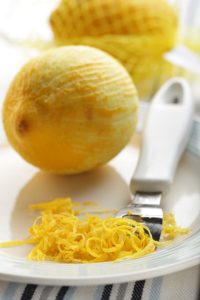
Lemon zest
Lemon zest is the yellow part of the lemon rind. (Zest can be taken from the rind of any citrus.)
The aromatic oils in the zest of a lemon—and other citrus–are the strongest just after zesting. So remove the zest just before using if you can. (Zest will keep in the freezer for up to 6 months.)
Zest can be used to flavor raw or cooked sweet or savory dishes.
The finer the zest is grated the more flavor the zest will release.
To remove zest without pith use a zester or a grater or strip off the zest with a potato peeler and shred fine with a knife.
Remove the zest before squeezing the juice otherwise juicing will be difficult.
To avoid any bitter taste, be sure to remove only the outer yellow skin, not the white pith below.
One medium lemon will yield 2 to 3 teaspoons of zest.
Lemon juice
To recover the most juice from a lemon, roll it firmly against a hard, flat surface or between your palms to crush some of its inner membranes. Don’t press too hard or you will crush the pith and infuse the juice with some bitterness. To extract the juice, use a reamer or insert a fork into the lemon and rotate it back and forth.
- Lemon juice is an essential flavoring for hollandaise, mayonnaise, egg-lemon soup, pies, soufflés, cakes, ice cream, and sherbet.
- A squeeze of lemon juice in the butter for vegetables will add a zesty tang.
- The acidity of lemon juice acts as a tenderizer in marinades for meat, game, or fish.
- Use lemon juice or a cut lemon rubbed in the cavity of poultry or game birds to freshen the meat and improve the taste.
- Serve lemon wedges or slices as a condiment or garnish for fish, shellfish, veal, and beef.
Juicing a lemon
Cut the lemon in half. Use a citrus reamer or a fork twisting in each lemon half. A medium-sized lemon should yield 2 to 4 tablespoons of juice.
To yield the maximum amount of juice, bring the lemon to room temperature and roll the lemon under the palm of your hand on the counter to soften the fruit and crush the juice cells. Press hard with the heel of your hand.
You can also pierce the lemon with a fork and microwave it on medium power for 15-25 seconds before squeezing.
If you only need a few drops of lemon juice, pierce the skin with a toothpick and squeeze out what you need. You can store the lemon by reinserting the toothpick and placing the lemon in a plastic bag in the refrigerator.
Freeze lemons for fresh juice
You can have fresh lemon juice on hand whenever you need it by halving lemons and storing them in a plastic bag in the freezer. When you are ready for the juice, defrost the lemon halves overnight and then squeeze. Freezing and thawing lemons seem to make them juicier.
Frozen lemon juice
Fresh-squeezed lemon juice can be poured into ice cube trays and frozen for up to 6 months. Freeze the juice in an ice cube tray; once hardened transfer the lemon cubes to a plastic bag for use later as needed.
Lemons release their juice more readily if they are kept at room temperature. If the lemon has been refrigerated, microwave it on High for 20 seconds before using.
How to make lemonade
Ade–such as lemonade and limeade–is a drink made by combining water, sugar, and citrus juice. Citrus juices have a thirst-quenching ingredient.
Here are two simple recipes for lemonade:
Lemonade for one
- Squeeze the juice from one lemon and add 1 tablespoon of sugar. Pour on one cup of boiling water, and cool.
Lemonade for four
- Combine ¾ cup sugar and 1 cup hot water in a pitcher
- Squeeze 4 to 6 lemons to make 1 cup of juice.
- (Use either still or aerated–sparkling–water.)
- Stir until the sugar is completely dissolved. Let cool.
- Add the lemon juice and 3 additional cups of cold water
- Add 5 or 6 thin lemon slices.
- Chill. Serve over ice cubes.
- Add more water, sugar, or lemon juice to taste.
Lemon vinaigrette recipe
- 2½ fluid ounces (76 mL) of wine vinegar
- 5½ fluid ounces (175 mL) of fresh lemon juice
- 1 tablespoon (15 mL) salt
- 1 teaspoon (5 mL) white pepper
- 3 cups (750 mL) salad oil, olive oil, or part salad oil and part olive oil
- Mix together the vinegar, fresh lemon juice, salt, and white pepper until the salt is dissolved.
- Use a wire whip or blender to mix in the oil.
- Mix or stir again before using.
Lemon flavor partners
Lemons have a flavor affinity for artichokes, capers, cumin, fennel, fish, garlic, mint, poultry, raspberries, shellfish, and thyme.
Lemons are very rich in vitamin C and also provide potassium and folic acid.
Lemons to prevent food discoloration
The ascorbic acid in lemons can be used to prevent the discoloring of the flesh of fruits and vegetables that oxidize when exposed to the air. Rub the cut surfaces of low-acid fruits and vegetables—such as bananas, peaches, and avocadoes—with lemon juice to delay oxidation and darkening.
About lemons
Lemons grow on small, evergreen trees that grow from 10 to 20 feet tall. The lemon’s purplish-white flowers bloom sporadically for much of the year, meaning the lemon also fruits much of the year. However, in very warm regions, lemon harvests are concentrated in autumn and spring. For the best flavor, a lemon should be picked as soon as it becomes fully yellow. Those that remain on the tree too long will become pithy and lose flavor.
Lemons are native to modern northwest India and Pakistan where they have been in cultivation for more than 2,500 years. Arab traders carried lemons from Asia to eastern Africa and the Middle East between 100 and 700 AD. The Arabs introduced the lemon into Spain in the eleventh century. Crusaders returning from Palestine in the twelfth century spread the lemon across the rest of Europe.
The lemon came into culinary use in Europe in the fifteenth century, and Christopher Columbus brought lemon seeds to the New World in 1493.
The lemon is a close relative of the lime. The names of both fruits came from the Arabic word līmach which means “citrus fruit”.
The botanical name for the lemon is Citrus limon.
Related articles:
Planning the Home Fruit Garden
Garden Planning Books at Amazon:
- Vegetable Garden Almanac & Planner
- Kitchen Garden Grower’s Guide Vegetable Encyclopedia
- Vegetable Garden Grower’s Guide
- Tomato Grower’s Answer Book
More kitchen tips:
Bring your harvest to the table. Kitchen prep tips and easy recipes for the vegetables you grow. Click below for vegetable prep and recipes you can use now.
- Almonds
- Apples
- Apricot
- Aprium
- Artichoke
- Arugula
- Asparagus
- Avocado
- Bamboo Shoots
- Banana
- Basil
- Beans, Dried
- Beans. Long
- Beans, Shell
- Beans, Snap
- Beets
- Bitter Melon
- Blackberry
- Bok Choy
- Broccoli
- Broccoli Raab
- Brussels Sprouts
- Cabbage
- Cardoon
- Carrots
- Cauliflower
- Celeriac
- Celery
- Chard
- Chayote Squash
- Cherimoya
- Cherries
- Chestnut
- Chickpea
- Chinese Cabbage
- Chives
- Cilantro
- Citron
- Clementine
- Collards
- Coriander
- Corn, Sweet
- Corn, Baby
- Corn Salad, Mache
- Cranberry
- Cress
- Cucumber
- Daikon
- Dandelion
- Dill
- Eggplant
- Endive, Belgian
- Endive and Escarole
- Fava Beans
- Fig
- Florence Fennel
- Garlic
- Ginger
- Grapefruit
- Grapes
- Guava
- Horseradish
- Jerusalem Artichoke
- Jicama
- Jujube
- Kale
- Kiwifruit
- Kohlrabi
- Kumquat
- Leeks
- Lemongrass
- Lemons
- Lettuce
- Lime
- Mache (Corn Salad)
- Mandarin Orange
- Mango
- Maple Syrup
- Marjoram
- Melons
- Michihili
- Mint
- Mizuna
- Mushrooms
- Mushrooms, Cremini
- Mustard Greens
- Napa Cabbage
- Nectarine
- Okra
- Olives
- Olive oil
- Onions
- Oranges
- Oregano
- Parsley
- Parsley Root
- Parsnips
- Passion Fruit
- Pawpaw
- Peaches
- Pears
- Peas, Garden Snap
- Peas, Snow
- Pei Tsai
- Peppers, Chili
- Peppers, Sweet
- Persimmon
- Pineapple
- Pineapple Guava
- Plantain
- Plums
- Pluots
- Pomegranate
- Potatoes
- Prickly Pear
- Pumpkin
- Quince
- Radicchio
- Radishes
- Raspberries
- Rosemary
- Rhubarb
- Rutabaga
- Sage
- Salsify
- Sauerkraut
- Savory
- Shallots
- Sorrel
- Spinach
- Squash, Summer
- Squash, Winter
- Strawberries
- Sunchokes
- Sunflower
- Sweet Potato
- Swiss Chard
- Tangerine
- Taro
- Tarragon
- Thyme
- Tomatillo
- Tomato
- Turnip
- Turnip Greens
- Yams


